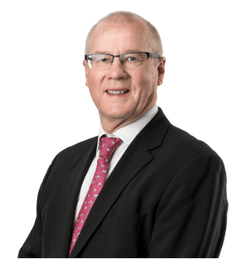|
When Melbourne domiciled Ron Dewhurst assumed the chairmanship of US$10 billion North American global mining and resources investment powerhouse Sprott Inc two weeks ago it was not an unexpected appointment.n Melbourne domiciled Ron Dewhurst assumed the chairmanship of US$10 billion North American global mining and resources investment powerhouse Sprott Inc two weeks ago it was not an unexpected appointment.  After leaving behind a distinguished early athletics background, notably as a successful coach, Dewhurst has built a four-decades business career, about half of which has been lived outside his native Australia. Most of that has been spent in senior executive positions where he was called upon to focus on team building and mentoring. The new post will require him to make the trip to Toronto on a regular basis but he is no stranger to the nomadic business life. His globetrotting path has led him to prolonged stretches in New York, London, Hong Kong and back to New York. It was during his second US stint while working as the head of global investment managers at Legg Mason that he was introduced to Whitney George, then chief investment officer of Royce Funds. LM had acquired Royce in 2001. About three years ago, George, now Sprott Inc president, reached out to Dewhurst for some advice. "Initially, the company was looking to reshape the business and I was invited in to hear the long-term strategy and give them my thoughts on the best way forward. It was a well-known name as a small-to-mid-cap fund manager specializing in the precious metals space," Dewhurst told Mining Journal in his first interview since taking the Sprott role. "I met with senior executives including Eric Sprott and Peter Grosskopf and it became clear that they were interested in taking it in a new direction." Soon after, he joined the board at the beginning of 2017. "There has been a shift in emphasis with the company looking to broaden its well-honed skills in asset managing, lending, advisory work and direct capital investment by commodity and geographically." Ron Dewhurst: No stranger to the nomadic business lifeDewhurst likens the new model to the traditional old-style UK-style merchant bank example. "It is a style that had been ignored for a time but looks to be back in fashion," he said. Sprott Inc CEO, Grosskopf has described the recent spate of new tech IPOs as being executed at price-to-sales valuations "based on ludicrous multiples eerily reminiscent of the dot-com bubble of 2000". "We understand that it is hard to resist the siren song of the solid track record that has been created by the investment industry in the past 10 years and the three decades which preceded it as the boomer generation propelled the markets and the economy," Grosskopf said. "There is also ample logic to suggest that when helicopter money drops one must have some allocation to solid growth and value stocks as well as dividend-paying real assets. "These positions should broadly benefit from the growth and inflation that is initially generated as governments print more money." The Sprott history dates back to 1981 when Eric Sprott, a pioneer of investing in precious metals, took the decision to take his investment model to a broader audience. It is a model that still holds up today as evidenced by his personal backing of the outstandingly successful development of the Fosterville gold mine in Victoria and Macassa property in Ontario by Kirkland Lake where he remains a 10% shareholder. While Sprott no longer has active day-to-day involvement with the company that bears his name he remains a large shareholder and important supporter. The Sprott Inc of today has evolved greatly from its original focus as an institutional broking firm working on behalf of mainly Canadian small to mid-cap natural resources companies. With a client base of more than 200,000, it is now a Toronto Stock Exchange listed global asset manager with interests ranging from physical bullion trusts, to mining Exchange Traded Funds, direct equity provision and resources lending. The global emphasis is a concept that Dewhurst is most comfortable with and harks back to his sporting beginnings. In 1975, the younger Ron self-financed a two month trip to Kiev, then a part of the Soviet Union, to observe the coaching methods employed by athletes such as the great Olympic champion Valeriy Borsov first hand. "They were going through a phase of incredible success and I wanted to see what they were doing that we weren't in Australia," Dewhurst said. Soon afterwards began his move into the finance sector. However, five years later, he took a decision to put a temporary hold on his newfound flourishing business career. After joining the boycott of the 1980 Moscow Olympics acclaimed Australian athlete Raelene Boyle reached out to Dewhurst, her long-time coach and confidant. The decision not to compete again at the highest level had been a profound moment for Boyle. It appeared to some to signal the anti-climactic end to a distinguished career competing cleanly in an era tainted by rampant performance enhancing drug use. After earnest consultation, Boyle and Dewhurst decided that there would be a last hurrah. Boyle went on to take the gold medal in the 400m final in the 1982 Commonwealth Games in Brisbane and retired as the single highest medal winning athlete in those games' history. When Boyle was honoured with Legend status by The Sport Australia Hall of Fame in 2017 she delivered an emotional tribute to her old coach. She said that as importantly as convincing and preparing her to run the 400m, a distance she detested because of the hard work involved, he had taught her about the need to balance her life after sport. While his experience in competitive athletics is long past, for Dewhurst the coaching has never really stopped. His international banking experience included time running JP Morgan Asset Management in New York after establishing and building the Wall Street bank's Asian equities operation in Hong Kong and overseeing the international equities operation in London. One of his most monumental moments came when heading up the JP Morgan unit on September 11, 2001, when he was managing people located about 2km from the Twin Towers. While the company had advised staff to remain in the building, Dewhurst gave his charges the option of packing up their desks and leaving, particularly if they had family in Manhattan or even wanted to go outside to try to understand what was happening. "Companies have disaster recovery plans but when something so utterly unpredictable occurs, people do unusual things," he said. Coach Dewhurst left the decision in the hands of his players.
6 Comments
|
Authors:Robert Kennedy Archives
December 2022
Categories
All
|

 RSS Feed
RSS Feed